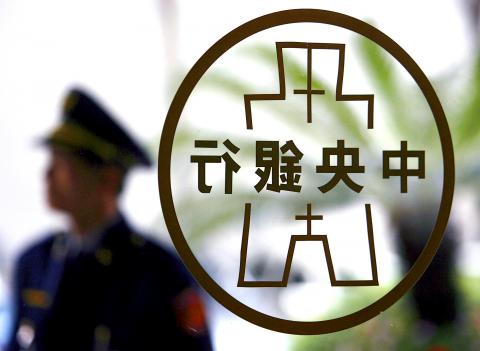The New Taiwan dollar has risen in value by 7 percent so far this year, sparking concerns the appreciation will impact upon Taiwan’s exporters. Hiwin Technologies Corp chairman Eric Chuo has called on the central bank to eliminate the interference of inflows and outflows of hot money, saying that rises and falls in the value of a country’s currency should be governed by the degree to which it is competitive.
At the company’s investors’ conference on Wednesday last week, while discussing the NT dollar, Chuo noted that the exchange rate has an impact upon import and export companies, adding that 80 percent of Hiwin Technologies’ sales come from exports, which means that the company’s profit is affected by exchange rate fluctuations.
Chuo also said Taiwanese industries need to upgrade and improve the added-value of their products in order to cushion the effect of currency fluctuations.

Photo: Reuters
照片:路透社
Given the current situation with hot money flows affecting the exchange rate, the central bank should stabilize the exchange rate by eliminating factors which cause inflows and outflows of hot money. While Chuo said he can appreciate the government’s predicament, he noted that the situation is different in Taiwan from that of the US since hot money does not have a significant impact on the US economy.
(CNA, translated by Edward Jones)
新台幣匯價今年以來漲幅約百分之七,成為影響出口表現隱憂。上銀董事長卓永財表示,中央銀行應排除熱錢進出干擾,貨幣升貶應該與國家競爭力相關。
上銀上禮拜三舉辦法人說明會。談到新台幣匯率,卓永財重申,本國貨幣匯率影響進出口廠商,上銀有八成以出口外銷為主,也會受到匯率波動影響損益。
卓永財指出,產業要升級提高附加價值,減緩匯率波動的影響。
卓永財重申,目前熱錢進出影響匯率走勢,匯率的穩定應該要把熱錢因素排除,他建議中央銀行應排除熱錢進出干擾。卓永財表示,可以體諒政府的難處,不過美國和台灣不一樣,熱錢進出對於美國沒有太大影響。
(中央社)

Pigs that are resistant to a deadly viral disease have been created by scientists at Edinburgh’s Roslin Institute. The gene-edited animals remained healthy when exposed to classical swine fever (CSF), a highly contagious and often fatal disease. The virus was eradicated in the UK in 1966, but there have been several outbreaks since and it continues to pose a major threat to pig farming worldwide. “Classical swine fever is a devastating disease for livestock and farmers as we saw with the outbreak in the UK, 25 years ago,” said Helen Crooke, mammalian virology deputy leader at the Animal and Plant Health Agency

Have you ever seen a circular intersection where cars continuously flow in one direction around a central island? That is a “roundabout,” a well-known alternative to traditional intersections. Drivers enter and exit at different points without relying on traffic lights. Their primary purpose is to improve traffic flow and minimize the likelihood of high-speed collisions, particularly dangerous T-bone and head-on crashes. Roundabouts have existed and been implemented for over a century. In the 1960s, the modern roundabout emerged in the UK, with added rules for yielding. Unlike intersections with red lights, roundabouts allow vehicles to continue moving at a

The stress of a long workday was really weighing Sarah down, and she felt the urgent need to get away. The moment the thought of escape crossed her mind, her fingers flew to the keyboard and typed “travel destinations.” Later, while she was casually scrolling through her social media, she was met with a flood of travel ads. There were lots of options, such as a serene hideaway in Kyoto and a luxurious beach villa in Bali, each perfectly echoing her desire. This is the magic of the recommender system at work. Recommender systems offer personalized suggestions by tracking your digital

對話 Dialogue 清清:明天我想請一天假。 Qīngqing: Míngtiān wǒ xiǎng qǐng yì tiān jià. 華華:為什麼?這個月的假已經很多了,你還要請假啊? Huáhua: Wèishénme? Zhège yuè de jià yǐjīng hěn duō le, nǐ háiyào qǐngjià a? 清清:因為明天是農曆九月初九重陽節,重陽節是老人節,我想陪我阿公阿嬤去爬山,而且家裡也要拜祖先,請假比較方便。 Qīngqing: Yīnwèi míngtiān shì nónglì jiǔ yuè chū jiǔ Chóngyáng Jié, Chóngyáng Jié shì Lǎorén Jié, wǒ xiǎng péi wǒ āgōng āma qù páshān, érqiě jiālǐ yě yào bài zǔxiān, qǐng jià bǐjiào fāngbiàn. 華華:了解,是應該陪老人出去走走。阿公阿嬤應該會拿到政府發的紅包吧? Huáhua: Liǎojiě, shì yīnggāi péi lǎorén chūqù zǒuzǒu. Āgōng āma yīnggāi huì nádào zhèngfǔ fā de hóngbāo ba? 清清:有啊!65歲以上的長輩都會領到敬老金,只是每個縣市給的數字不太一樣,年紀越大,拿到的會越多喔! Qīngqing: Yǒu a! Liùshíwǔ suì yǐshàng de zhǎngbèi dōu huì lǐngdào jìnglǎojīn, zhǐshì měi gè xiànshì gěi de shùzì bútài yíyàng, érqiě niánjì yuè dà, ná dào de huì